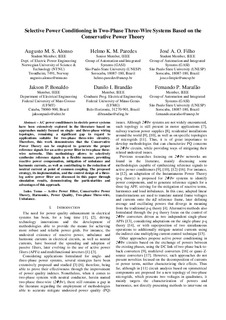| dc.contributor.author | Alonso, Augusto Matheus Dos Santos | |
| dc.contributor.author | Paredes, Helmo | |
| dc.contributor.author | Filho, Jose A. O. | |
| dc.contributor.author | Bonaldo, Jakson Paulo | |
| dc.contributor.author | Brandao, Danilo Iglesias | |
| dc.contributor.author | Marafao, Fernando Pinhabel | |
| dc.date.accessioned | 2019-12-04T12:37:15Z | |
| dc.date.available | 2019-12-04T12:37:15Z | |
| dc.date.created | 2019-11-29T16:25:43Z | |
| dc.date.issued | 2019 | |
| dc.identifier.isbn | 978-1-5386-4540-6 | |
| dc.identifier.uri | http://hdl.handle.net/11250/2631761 | |
| dc.description.abstract | AC power conditioners in electric power systems have been extensively explored in the literature based on approaches mainly focused on single- and three-phase wiring topologies, remaining a significant gap in regard to applications suitable for two-phase three-wire circuitry. Therefore, this work demonstrates that the Conservative Power Theory can be employed to generate the proper reference signals for an active power filter in two-phase three-wire networks. This methodology allows to selectively synthesize reference signals in a flexible manner, providing reactive power compensation, mitigation of unbalance and harmonic currents, as well as contributing to the reduction of neutral current at point of common coupling. The proposed strategy, its implementation, and the control design of a three-leg active power filter are discussed in this paper through simulation results, demonstrating the particularities and advantages of this approach. | nb_NO |
| dc.language.iso | eng | nb_NO |
| dc.publisher | Institute of Electrical and Electronics Engineers (IEEE) | nb_NO |
| dc.relation.ispartof | 2019 IEEE Industry Applications Society Annual Meeting | |
| dc.title | Selective Power Conditioning in Two-Phase Three-Wire Systems Based on the Conservative Power Theory | nb_NO |
| dc.type | Chapter | nb_NO |
| dc.description.version | acceptedVersion | nb_NO |
| dc.source.pagenumber | 1-6 | nb_NO |
| dc.identifier.doi | 10.1109/IAS.2019.8911909 | |
| dc.identifier.cristin | 1754776 | |
| dc.relation.project | Norges forskningsråd: 261735 | nb_NO |
| dc.description.localcode | © 2019 IEEE. Personal use of this material is permitted. Permission from IEEE must be obtained for all other uses, in any current or future media, including reprinting/republishing this material for advertising or promotional purposes, creating new collective works, for resale or redistribution to servers or lists, or reuse of any copyrighted component of this work in other works. | nb_NO |
| cristin.unitcode | 194,63,20,0 | |
| cristin.unitname | Institutt for elkraftteknikk | |
| cristin.ispublished | true | |
| cristin.fulltext | postprint | |
| cristin.qualitycode | 1 | |
